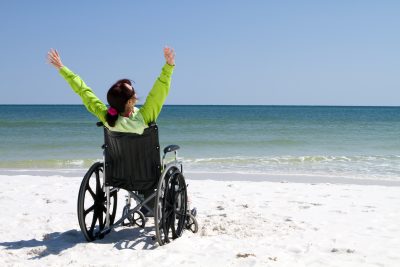By Kyann Flint
Being stubborn is the right approach when it means self-determination. Having the drive to learn what you want and need and then speak up for yourself gives you control over your life.
I learned that lesson young. By age 6, I was advocating in my own healthcare. My doctor wanted to stick a swab up my nose and down my throat at the same time. I told him, “No!” and asked, “What would that accomplish?” I was not sick. Why put me through that? I had been through enough tests. If this one was not going to improve my pain or give me a diagnosis, then it did not need to happen. Because I spoke up, it didn’t!
My parents supported my growing self-advocacy and also advocated for me. As my voice blossomed, so did my skills for self-determination. The self-determination skills I worked on throughout childhood have helped me gain independence and make some of the most important adult decisions of my life.
When I was 8, I was diagnosed with a type of genetic peripheral neuropathy called Charcot Marie Tooth (CMT). The coating around my nerves becomes scarred and cannot be repaired, making it hard for my brain to tell my legs, arms, feet, and hands what to do.
I continued to have symptoms that did not quite fit this diagnosis, so testing continued. By age 12, I started asking whether further diagnoses would improve my quality of life. The answer was no, so I chose to end the poking and prodding and deal with my symptoms as they came.
Right after I turned 21, I was in tremendous pain and needed more help. Three years later, I had a second diagnosis: Heredity Spastic Paraplegia. Four years after that, the cause of my pain was finally found. My bladder was failing, which made it difficult to go to the bathroom. I eventually lost the ability to go to the bathroom on my own. On September 30, 2020, I made one of the best decisions of my life and had the Mitrofanoff surgery that now allows me to go to the bathroom independently.
I needed a lot of self-determination to get to this point. Before the surgery, one doctor advised against it, explaining that I wasn’t a good candidate due to my progressive neuromuscular disorders. She predicted that I would be incapacitated one day, so “why bother?” I decided that even if she were right, I wanted the independence that the surgery could provide now. I found a new surgeon. I am so thankful that I did!
My surgeon related well with me and supported my belief that I was “worthy” of this procedure. He agreed that it was a good choice to enable me to live more independently right now. The choice to proceed wasn’t easy or pain-free. I needed many tests and procedures, including a colonoscopy without anesthesia. Delays in scheduling the surgery tested my self-determination, but I persevered.
My surgery included a week in the hospital and months of recovery, but my stubborn nature helped me get through it all, despite the frustration of having limited manual dexterity and being legally blind. But I figured out how to go to the bathroom independently!
It took a lot of self-determination to move forward with one of the best decisions of my life, but I am proud that I made this decision. If you have a decision to make in your life, I hope you will tap into your own stubborn self-determination. Figure out what you need and want and speak up for yourself. I’m so glad I did.
About the author: Kyann Flint, Director of Accessibility for Wandke Consulting, is a passionate advocate for the disability community. As a person with a disability, she strives to educate society on how social barriers, like ignorance and stereotypes, limit the disability community. Kyann loves coffee and traveling.

